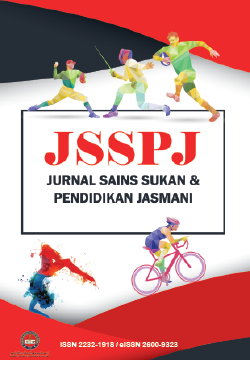Advancing Malaysia’s Recreational Studies: Application of Structural Equation Modelling (SEM) in Validation of Adventure-Based Mental Toughness Model (AbMTM)
DOI:
https://doi.org/10.37134/jsspj.vol11.1.5.2022Keywords:
mental toughness, adventure-based programAbstract
Over decades, there are numerous training programs with the intervention of adventure-based programs have been implemented. The nature of adventure-based programs is also often associated with the development of psychological aspects including mental toughness. However, the fact is the term of mental toughness is more focused in the perspective of sports. Since it was first introduced in the 80's, various models and measuring instruments have been developed and are clearly more focused on the sports perspective. The issues arises when the sport-based mental toughness model is applied in adventure-based programs. Work on this matter, Adventure-based Mental Toughness Model (AbMTM) was developed with the application of Structural Equation Modeling (SEM). SEM was well known in development studies because of the effectiveness of its statistical analysis to determine the value or validity of the measured focus. It turned out to be very influential and applied in various fields of study. A total of 507 respondents were involved among individuals who had been involved in adventure-based programs in 2019 to 2020. As results, SEM analysis through Confirmatory Factor Analysis (CFA) and Goodness of Fit (GoF) strongly suggests the 7 dimensions of AbMTM was indicates the value of an excellent fit model. The results of this study, provide a new horizon and advancing the current field of recreational study.
Downloads
References
Bell, J. J., Hardy, L., & Beattie, S. (2013). Enhancing mental toughness and performance under pressure in elite young cricketers: A 2-year longitudinal intervention. Sport, Exercise, and Performance Psychology, 2(4), 281.
Bowen, D. J., & Neill, J. T. (2013). A meta-analysis of adventure therapy outcomes and moderators. The Open Psychology Journal, 6(1).
Bull, S. J., Shambrook, C. J., James, W., & Brooks, J. E. (2005). Towards an understanding of mental toughness in elite English cricketers. Journal of Applied Sport Psychology, 17(3), 209-227.
Butt, J., Weinberg, R., & Culp, B. (2010). Exploring mental toughness in NCAA athletes. Journal of Intercollegiate Sport, 3(2), 316-332.
Clough, P., Earle, K., & Sewell, D. (2002). Mental toughness: The concept and its measurement. Solutions in Sport Psychology, 32-43.
Clough, P., Houge Mackenzie, S., Mallabon, L., & Brymer, E. (2016). Adventurous physical activity environments: a mainstream intervention for mental health. Sports Medicine, 46(7), 963-968.
Coulter, T. J., Mallett, C. J., & Gucciardi, D. F. (2010). Understanding mental toughness in Australian soccer: Perceptions of players, parents, and coaches. Journal of Sports Sciences, 28(7), 699-716.
Crust, L., & Azadi, K. (2010). Mental toughness and athletes' use of psychological strategies. European Journal of Sport Science, 10(1), 43-51.
Crust, L. (2008). A review and conceptual re-examination of mental toughness: Implications for future researchers. Personality and Individual Differences, 45(7), 576-583.
Davidson, C. (2016). Building character through adventure education: A study of Levels of Grit and Resilience in Outward Bound Students (Doctoral dissertation, Indiana University).
Delahaij, R., & Van Dam, K. (2017). Coping with acute stress in the military: The influence of coping style, coping self-efficacy and appraisal emotions. Personality and Individual Differences, 119, 13-18.
Ewert, A. W. (1989). Outdoor Adventure Pursuits: Pub. Horizons.
Fourie, S., & Potgieter, J. R. (2001). The nature of mental toughness in sport. South African Journal for Research in Sport, Physical Education and Recreation, 23(2), 63-72.
Gaskin, J., James, M., & Lim, J. (2019). Master Validity Tool. AMOS Plugin In: Gaskination's StatWiki, 2019.
Golby, J., Sheard, M., & Van Wersch, A. (2007). Evaluating the factor structure of the psychological performance inventory. Perceptual and Motor Skills, 105(1), 309-325.
Gucciardi, D. F., & Gordon, S. (2009). Revisiting the performance profile technique: Theoretical underpinnings and application. The Sport Psychologist, 23(1), 93-117.
Hair, J. F., Celsi, M., Money, A., Samouel, P., & Page, M. (2015). The essentials of business research methods: The Essentials of Business Research Methods: 1–494.
Hashim, A. (2014). Panduan Analisis Data Secara Efisien: Panduan Lengkap Berajah untuk Menganalisis Data. Dubook Press.
Henseler, J., Ringle, C. M., & Sarstedt, M. (2015). A new criterion for assessing discriminant validity in variance-based structural equation modeling. Journal of the Academy of Marketing Science, 43(1), 115-135.
Lekies, K. S., Yost, G., & Rode, J. (2015). Urban youth׳ s experiences of nature: Implications for outdoor adventure recreation. Journal of Outdoor Recreation and Tourism, 9, 1-10.
Loehr, J. (1982). Mental Toughness Training for Sports: Achieving Athletic Excellence. Plume.
Mackenzie, S. H., Son, J. S., & Eitel, K. (2018). Using outdoor adventure to enhance intrinsic motivation and engagement in science and physical activity: An exploratory study. Journal of Outdoor Recreation And Tourism, 21, 76-86.
Md Taff, M. A., Shafie, M.S., Zakaria, J., Mohd Yasim, M., & Abdul Rahman W.M. (2012) Effects of mental toughness in outdoor adventure program among Malaysian intervarsity athletes. The Journal of Sports Medicine and Physical Fitness, 52(1)(2012), 5 – 6.
Middleton, S. E., Shadbolt, N. R., & De Roure, D. C. (2004). Ontological user profiling in recommender systems. ACM Transactions on Information Systems (TOIS), 22(1), 54-88.
Pallant, J. F., & Lae, L. (2002). Sense of coherence, well-being, coping and personality factors: Further evaluation of the sense of coherence scale. Personality and Individual Differences, 33(1), 39-48.
Saedah, S., Muhammad Ridhuan, T. L. A., & Rozaini, M. R. (2020). Pendekatan Penyelidikan Rekabentuk dan Pembangunan (PRP): Aplikasi kepada Penyelidikan Pendidikan. Tanjong Malim, Perak: Universiti Pendidikan Sultan Idris (UPSI).
Sekaran, U., & Bougie, R. (2016). Research Methods for Business: A Skill Building Approach. John Wiley & Sons.
Shafie, M. S., & Che Mat, H. (2014). Advancing Recreational Studies: An Analysis of Mental Toughness in Outdoor Adventure Program. In Proceedings of the International Colloquium on Sports Science, Exercise, Engineering and Technology 2014 (ICoSSEET 2014) (pp. 267-276). Springer, Singapore.
Sheard, M., Golby, J., & Van Wersch, A. (2009). Progress toward construct validation of the Sports Mental Toughness Questionnaire (SMTQ). European Journal of Psychological Assessment, 25(3), 186-193.
Virden, R. (2006). Outdoor and Adventure Recreation: Introduction to Recreation and Leisure (Edt. HumanKinetics). Human Kinetics Inc., USA.





